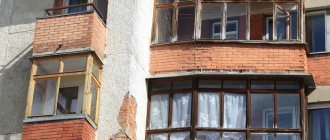The concept of "communal apartment"
Today, such a definition as “communal apartment” is common in everyday life. But if we analyze modern legislation, this concept has no legal force. Therefore, when disclosing this housing issue, the term “communal apartment” should be used.
What is a communal apartment? One of the obvious disadvantages of the modern housing complex of the Russian Federation is that it does not clearly define the concept of a communal apartment. This leads to the emergence of numerous ambiguities and contradictions in the legislation, in particular, codes and laws in force in the territory of individual constituent entities of the Russian Federation.
Many lawyers and scientists have attempted to interpret the concept of a communal apartment, but even the most experienced lawyer will not dare to give an exact definition of this category of housing. If we analyze all the accumulated theoretical experience, we can derive a generalized definition.
A communal apartment is an apartment that consists of several rooms owned either under a social lease agreement or by right of ownership. At the same time, the key factor in communal living is the presence of two or more owners.
Of course, such an interpretation is formal in nature, but despite this, it does not contradict the RF LC. In addition, this point of view is confirmed by the classification of communal apartments, which is recorded in the Housing Code:
- apartments, living rooms that are used by tenants for living after the official conclusion of a social rent agreement with the state;
- apartments divided into rooms that belong to the owners by right of ownership;
- mixed-type apartments, which mean that both tenants under a rental agreement and the owners of the rooms live under one roof.
The concept of “common property of a communal apartment”
A communal apartment is not only living rooms, but also additional property that is of a common nature. All residents of a communal apartment, without exception, can use this usable area, since the collective property belongs to them on the right of shared ownership.
The common property of the owners of rooms in a communal apartment implies the imposition of certain rights and obligations on the participants in legal relations. Namely, Article 43 of the Housing Code of the Russian Federation imposes on the owners of rooms the burden of expenses required for the maintenance of common property in a communal apartment.
The financial costs of each owner are calculated using a fairly simple formula. The share of expenses that are mandatory is calculated taking into account the share of common property that is allocated to the owner in accordance with the legislation of the Russian Federation. Accordingly, the greater the share of common property, the greater the owner’s costs for maintaining common property in a communal apartment.
The common property consists of several categories of utility premises:
- kitchen space where collective stoves and plumbing are installed;
- corridors in which owners have the right to install furniture and other property, but without infringing on the interests of neighbors in full accordance with their share;
- bathroom or shower;
- toilet;
- change house and any other utility room.
None of the residents has the right to prevent other residents of the apartment, including tenants, from using common property, which is secured by the right of common shared ownership. In case of such prohibitions, a citizen has the right to appeal to a court, which will determine the legality of such behavior.
Another comment on Art. 42 of the Housing Code of the Russian Federation
1. The share of the owner of the room (rooms) in the right of common ownership of the common property of a communal apartment is determined in proportion to the total area of the room (rooms). Calculation of the total area of the room: the area of the auxiliary premises is divided by the number of rooms in the communal apartment. The part of the auxiliary premises per room and the living area of the room gives (in total) the total area of the room. This area is the basis for determining the share in the right of common ownership of common property in a communal apartment - in proportion to the total area of the room.
2. A share in the right of common ownership of common property in a communal apartment is an integral part of the room and always follows the fate of the ownership of it. When the owner of a room changes, the share of the new owner in the right of common ownership is equal to the share of the previous owner.
The owner of a room in a communal apartment is deprived of the opportunity to allocate in kind his share in the right of common ownership of the common property of a communal apartment and to alienate it separately from the alienation of the room.
3. When selling a room in a communal apartment, the remaining owners of the rooms have a pre-emptive right to purchase this room in the manner and under the conditions established by the Civil Code of the Russian Federation.
The procedure for selling a share is as follows: the seller is obliged to notify in writing the owners of all other rooms in this apartment of his intention to sell his room, indicating the price and other conditions under which it is being sold. Any of the other owners has the right to buy it on these terms within a month; otherwise, the owner has the right to sell his room to any person (Article 250 of the Civil Code of the Russian Federation).
If the seller violates the preemptive right of the owners of other rooms, any of them may, within 3 months, demand the transfer of the rights and obligations of the buyer to him. To do this you need to go to court.
Today on the real estate market, developers only offer areas of approximately 30 square meters or more, and shared ownership allows you to purchase an area of 16 to 30 m2, much cheaper than the market price for an apartment. The cost of a share in an apartment with city registration in a ready-made house that has already been commissioned starts from 1,200,000 rubles, and this is not a room, but a studio with a control room and a kitchen. It is actually possible to buy an apartment from a developer, not of a large area, today, but you will only be able to live there in 2021. Our company has developed a package of documents that allows us to eliminate possible disadvantages of shared ownership at the stage of purchasing an apartment and allows us to regulate the legal relations of new owners among themselves within the framework of common ownership. You can start using and managing your property today.
1) Purchasing your share from 1 owner or developer company directly without intermediaries.
Benefits:
— there is no increase in the price of the object
- no risk of losing money
2) Notarized waiver of the priority right to purchase a share in the apartment from all future owners
Benefits:
- you can sell your share in the property without notifying all owners
— no need to wait a month for consent, because refusals have already been received and are stored by the notary
3) A notarized agreement on the procedure for using the apartment allocates your share of the property in square meters and determines your area on the apartment plan.
Benefits:
- regulates legal relations between owners
- such a document allows you to pledge a share to the bank
— the document determines the procedure for using common areas and allocates your property in common ownership
In fact, you get a separate studio apartment with your own control room and kitchen area in the studio.
1) Each studio is equipped with its own metered electricity network, which does not depend on your neighbors. The apartment has a common meter for the corridor and a separate one for your studio.
2) Own separate meters are installed for water.
3) The layout, as a rule, does not need to be legalized, because We do not dismantle load-bearing walls and do not change the boundaries of the entire apartment. We do not install or locate wet areas above residential areas. The redevelopment is carried out by a legal entity in accordance with GOSTs and SNIPs adopted in the Russian Federation and has the right and permission to perform this type of work. As follows from the law:
Based on Article 26 of the Housing Code of the Russian Federation, there is no need to obtain permission from the Housing Inspectorate and coordinate the project in order to carry out the following types of work:
- installation of glazing on a loggia or balcony (but without changing the appearance of the facade);
- sealing or moving, expanding or reducing door openings in the internal partitions of the apartment, with the exception of load-bearing and inter-apartment partitions;
— demolition and installation of partitions that are not load-bearing and do not increase the load on the floors (wooden, plasterboard, less often brick, etc.);
— replacing the bathtub with a shower cabin;
- moving the stove within the kitchen.
4) With the above documents you receive:
allocated share in the property, which you can ATTENTION!!!
- buy, sell, bequeath, donate, lease, obtain registration in this property, mortgage it to the bank. The only difference will be a common cadastral number with several owners. General mailbox. Agree for a 30% discount on the cost per square meter, you can try to change your attitude towards this type of property))
5) It is possible to legalize the redevelopment of an apartment at the request of the owners; as a rule, a project is required, permission for redevelopment; the cost of turnkey documents can be around 200,000 rubles for 1 apartment. And for a period from 2 months to six months.
NOTE:
As the housing code of St. Petersburg says, paragraph 6 of Art. 1 (Law dated July 16, 2001, No. 572-73, as amended on November 18, 2002): “ A communal apartment is an apartment in the state housing stock of St. Petersburg or municipal housing stock, the residential premises in which are occupied under separate agreements ( social hiring, hiring, rent) by two or more employers (tenants) who are not spouses, parents, children or family members of the employer.”
Ownership of common property in a communal apartment
This aspect of cohabitation is discussed in more detail in Art. 41 Housing Code of the Russian Federation. That is why all practicing lawyers turn to this legal regulation in order to correctly interpret all controversial issues that arise.
According to the presented article, living rooms in a “communal apartment”, which have the status of isolated ones, are recognized by legislative norms as independent objects of property rights. In other words, legal acts oblige the state registration of all residential premises when carrying out legal transactions with the specified type of property and in other cases regulated by the federal legislation of the Russian Federation.
As for the issue of common property, in this case the premises are given the status of common shared ownership. The logical conclusion follows from this rule that state registration of the right to common property in such situations is not provided for by law.
The right of ownership extended to common property in a communal apartment arises due to the fact that the owner has the right of ownership to isolated living rooms.
In addition, it is interesting that a communal apartment itself is not recognized as a separate object of ownership. This rule was derived from the fact that only living rooms are recognized as the object of ownership in such apartments. The rest of the useful property of public use is in shared ownership.
Here another question arises - how is the transfer of a share of common property to the newly created owner carried out? The answer is simple. The right to a share in a communal apartment arises precisely at the moment when the new owner is endowed by law with the right of ownership of the acquired living rooms in the process of purchase and sale, donation, inheritance. In this case, the size of the share of the new owner must fully correspond to the size of the share of the common property of the old owner.
Terms of use
In Russia there are no detailed universal rules for living in communal apartments. They are usually formed at the settlement level. However, the basis for their adoption is the norms at the federal level.
Typically, municipal authorities issue regulations on the general rules of living in a given settlement. Living in communal apartments, as a rule, is devoted to a separate section of local regulations.
Residents themselves can create their own rules . In order for this standard to acquire legal force, it must be adopted at a general meeting of residents of the house, since the law delegates the authority to manage joint property only to this body. The main requirement for such documents is the need to ensure their compliance with laws at the federal, regional and local levels.
Restrictions imposed on room owners in communal apartments
The legislation of the Russian Federation establishes the principle that the fate of a share in a communal apartment in common property completely copies the ownership of the residential premises. In other words, it is impossible to alienate a share regardless of the room in a communal apartment. This rule is also confirmed by the fact that common property cannot appear in civil circulation as an independent object of property rights.
It is also impossible to alienate individual parts of the usable area of common property, which is regulated by law as shared property. The only thing that the owners of living rooms can do is to add common property to their property. Such modifications occur through redevelopment, refurbishment and reconstruction of premises.
Actions aimed at changing the property of collective use through redevelopment may cause the area of common use to be reduced in size.
In order not to violate the legitimate interests and rights of other citizens living in a communal apartment, the owner must obtain written consent from all homeowners. Only in such a case will codification actions in common shared ownership be recognized as legal.
In addition, redevelopment and refurbishment of common property in communal apartments in order to improve living conditions can occur by decision of all owners. An example is the case when the owners want to expand the kitchen by adding some corridor area. However, such transformations will be recognized as legal only if it is possible to obtain permission for such capital actions from local self-government bodies. To do this, at the place of request, you must provide a package of documentation specified by the Housing Code of the Russian Federation.
If local self-government bodies do not issue permission for reconstruction or redevelopment, then any changes will be considered uncoordinated. This will entail the imposition of liability on the owners, in particular, the court may oblige the owners to restore the previous appearance of the common property before the installation actions were carried out. At the same time, the period for restoration work is set at the discretion of local self-government bodies, since legislative acts do not provide any clear explanation in this regard.







